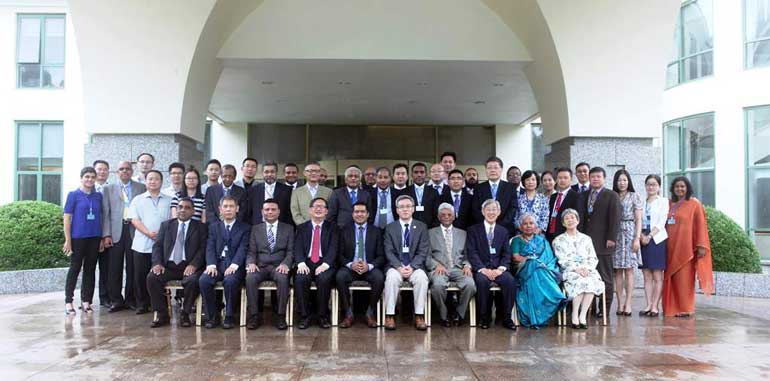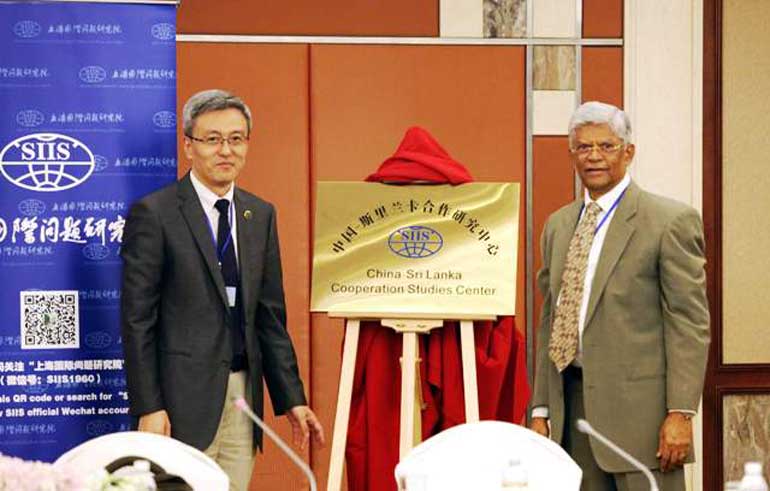Friday Feb 27, 2026
Friday Feb 27, 2026
Monday, 18 July 2016 00:00 - - {{hitsCtrl.values.hits}}

Team representative of Pathfinder Foundation and Shanghai Institutes for International Studies Second Symposium

Shanghai Institutes for International Studies Academic Affairs Council Chairman Yang Jiemian, State Minister of International Trade Sujeewa Senasinghe, Shanghai Institutes for International Studies President Prof. Chen Dongxiao and Pathfinder Foundation Chairman Bernard Goonetilleke

Shanghai Institutes for International Studies President Prof. Chen Dongxiao with Pathfinder Foundation Chairman Bernard Goonetilleke
The Second Symposium on the Maritime Silk Road and China-Sri Lanka Relations was held in Shanghai, China from 11-13 July.
The Chinese Embassy in Colombo made the logistical arrangements in support of the symposium, jointly organised by the Shanghai Institutes for International Relations (SIIS) and the Pathfinder Foundation (PF). The symposium consisted of two segments, an academic conference and a business roundtable, thereby providing an overview of the political and economy landscape and prospects for business collaboration available to both sides.
State Minister of International Trade Sujeewa Senasinghe participated in the three-day Track II symposium, delivering a keynote address, explaining the policies of the new government and responding to questions posed by Chinese scholars and representatives of leading Chinese business conglomerates, who are either already present in Sri Lanka or planning to make large scale investments in the island.
In addition to the Pathfinder Foundation represented by Bernard Goonetilleke, Prof. Sisira Pinnawala and Ameera Arooz; several other think tanks and institutions took part in the academic exchange. They included Indian Ocean Maritime Affairs Cooperation (Dr. Hiran Jayewardene), LIRNEasia (Professor Rohan Samarajiva), Institute of Policy Studies (Dr. Saman Kelegama), Bandaranaike International Diplomatic Training Institute (Pamela Deen) and Lakshman Kadirgamar Institute of International Relations (Ravindra Deyshappriya).
Several media personalities also took part in the symposium. They included Waruna Karunathileka Chairman, School of Journalism, as well as Shenali Waduge and Dharshan Weerasekera.
The Symposium commenced its work by inaugurating the China-Sri Lanka Cooperation Studies Center by of the Shanghai Institutes for International Studies President Prof. Chen Dongxiao and Pathfinder Foundation Chairman Bernard Goonetilleke. The newly established centre will function as the counterpart of the China-Sri Lanka Cooperation Studies Center, functioning under the Pathfinder Foundation, inaugurated by the Chinese Ambassador in Sri Lanka in October last year.
The first part of the symposium covered several subjects: Overviewing of Global and Regional Situation, China-Sri Lanka Bilateral Cooperation: Opportunities and Challenges, The 21st Century Maritime Silk Road and Sri Lankan Development, Government-Market Relations. This part of the symposium was concluded with a brain storming session on ‘Visions of China-Sri Lanka Cooperation and Policy Suggestions’.
A business roundtable involving private sector representatives of both countries followed the academic discussions. MICRO Chairman Lawrence Perera, Jetwing Hotels Managing Director Ruan Samarasinghe, Hayleys Advantis Head of Projects Ravi Karunaratne, NTB Chairman Krishnan Balendra, Maharaja Organization Projects Ltd. Executive Director Nimal Cooke and Access Group Director, Business Development Dharshana Munasinghe highlighted investment potential in Sri Lanka.
The general message communicated to the Chinese businesses was that the era of unsolicited offers to the government to be financed by foreign borrowings is over due to the heavy debt burden the government has to carry. Consequently Sri Lankan business leaders urged the Chinese business community to join hands with Sri Lankan private companies, who have the resources as well as experience to identify and launch joint ventures. The other opening they recommended was to participate in PPP projects.
They pointed out that the FTA between Sri Lanka and China will be concluded by early 2017. This would open new vistas for Chinese companies to penetrate in to India and Pakistan, which jointly boast of a population of 1.5 billion, while Indian and Pakistani companies too would benefit by gaining access to the Chinese market taking advantage of the China-Sri Lanka FTA.
The Chinese companies that expressed their scepticism over the investment prospects in Sri Lanka in November last year during the first symposium, appeared to be more positive of the improving investment climate in Sri Lanka following the visit of Prime Minister Ranil Wickremesinghe to China in April this year. Among the participating companies from China were Beijing International Trust, Chongqing Foreign Trade and Economic Cooperation, China Harbour Engineering, Chinese Rayong Industrial Park, Pacific Rim Zhengzhou Yutong and SINOMA.
Their presentations revealed the interest of Chinese companies have in Sri Lanka. Deputy Manager China Harbour Engineering said that the suspended Colombo Port City would recommence its work by October. In response to the interest shown to commence an industrial park in Hambantota, Pathfinder Foundation pointed out that there was a lack of skilled workers to support such a venture in Hambantota and recommended that the Chinese government, in association with the Chinese industry, could help establishing a technical college, similar to the German Technical College in Ratmalana, to address the shortage of technically qualified youth to service the Hambantota Industrial Park.
The Business Round Table was also attended by State Minister Sujeewa Senasinghe, who said that it was an ‘all win’ relationship as both countries look towards mutually benefiting cooperation that will also take into consideration environmental protection. He said that in the past we have learnt from working with the West and now willing to learn how to work with China and India. He said that the President and Prime Minster are committed to attracting projects that are funded by foreign direct investment, create employment, transfer technology and generate income within the country. He encouraged the Chinese private sector to use Sri Lanka as a gateway to South Asia as well as South East Asia.
The Business Round Table acknowledged that the Chinese and Sri Lankan companies would require support in establishing joint ventures etc. in the two countries. The Pathfinder Foundation and the Shanghai Institute of International Studies agreed to provide requisite support through their newly established two centres with the cooperation of the respective embassies.